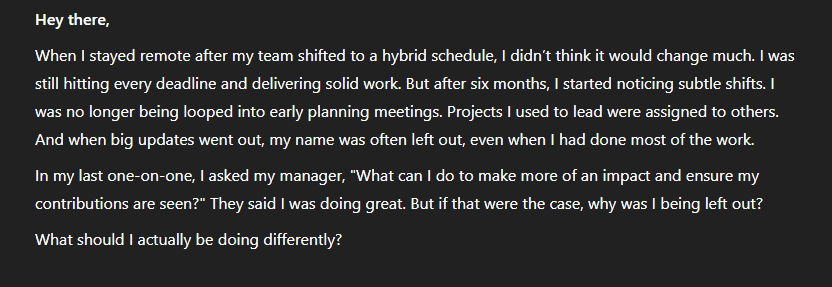- NOT FOR COMPANY USE
- Posts
- 💥How being too good at remote work can backfire
💥How being too good at remote work can backfire
One psychological bias might be blocking your next raise.

Receive Honest News Today
Join over 4 million Americans who start their day with 1440 – your daily digest for unbiased, fact-centric news. From politics to sports, we cover it all by analyzing over 100 sources. Our concise, 5-minute read lands in your inbox each morning at no cost. Experience news without the noise; let 1440 help you make up your own mind. Sign up now and invite your friends and family to be part of the informed.
Hey there, banished tribe members,
Welcome to the Stone Age world of proximity bias, where your rewards and recognition matter less than your ability to physically warm a chair near the chief's cave.
A fancy 2025 study just proved what we already knew: managers automatically assume hybrid workers are less productive than their fully on-site colleagues, with hybrid workers facing a 7.7 percent lower probability of receiving a promotion and a 7.1 percent lower probability of getting a salary increase – even when they perform exactly the same.
🧨 THE RANT
Me See You, You Get Shiny Rocks. Me No See You, You Get Nothing.
Here's where it gets really prehistoric: A groundbreaking study with nearly 1,000 UK managers just exposed the shocking truth.
When these cave-dwelling leaders had no performance data, they automatically penalized hybrid workers for promotions and raises. But here's the kicker – when they were literally told that a hybrid worker performed exactly the same as an office worker, the penalty magically disappeared. Turns out, when you force cavemen to look at facts instead of relying on their primitive "me see worker, worker good" instincts, they can actually make rational decisions!

Managers are out here acting like it's still 10,000 BC, when the most advanced technology was fire and the wheel hadn't been invented yet. They're distributing rewards and recognition like we're still operating by "who the chief can see from his rock throne."
The Gender Cave-astrophe
Just when you thought proximity bias couldn't get more primitive, the research revealed how it intersects with gender in spectacularly discriminatory ways:
Fathers and childless men: who work from home get double-clubbed – penalized for both assumed poor performance AND lack of commitment. Apparently, asking for flexibility makes these guys "bad hunters" who are shirking their tribal duties.
Mothers: Hit with the ultimate lose-lose scenario – not penalized for working remotely UNLESS they only perform as well as office workers. Then they're punished for not being superhuman. Apparently, the price of flexibility is working 150% as hard as everyone else.
Childless women: Often escape penalties, possibly because managers need someone to favor to maintain their "I'm not biased!" credentials.
The Mammoth in the Room
This isn't just unfair – it's a hidden tax draining organizations of their most valuable assets. While these stone-age managers are busy punishing their best performers for their work location, they're actively sabotaging their own workplaces.
They're choosing "face time" over actual contribution, visibility over value, and proximity over productivity. It's like judging the quality of a hunt not by how much meat was brought back, but by how often the hunter was seen sitting around the fire.
📊 DATA THEY HOPE YOU IGNORE
Remote workers receive 31% fewer promotions despite being 15% more productive.
Source: (Wall Street Journal & Great Place to Work, 2025)
Translation?
Even when confronted with evidence that remote workers perform just as well, managers still assume they're less "dedicated to the tribe."
🔦 Subscriber Story Spotlight

🗣️ Want to tell your story?
We feature real anonymous ones every week, yours could be next.
💬 Real Talk
When you're not physically visible, people start rewriting the narrative of your value. It’s not fair, and it’s not based on performance. It’s proximity bias, and it’s baked into how most workplaces still measure influence.
When you're not in the room for early conversations or casual recaps, you lose out on critical visibility, even if your work is excellent. People start forgetting what they can’t see. And once that happens, you're playing catch-up on a story you never got to help write.
So what can you do?
You do what great remote leaders and operators have always done. You control the narrative. You stop hoping your contributions will speak for themselves, and instead you speak for them, clearly, calmly, and consistently.
Which leads us to…
💡 POWER MOVE OF THE WEEK
Build a “Visibility Layer” Into Your Work - Without Sucking Up

